Mobile Home Anchors Guide 2025
Complete anchor installation, HUD compliance, and wind zone requirements from experts who've secured 1,000+ mobile homes
HUD Compliance
Expert guidance on HUD code requirements and wind zone specifications
Installation Guide
Step-by-step professional installation instructions and safety protocols
Storm Protection
Proven anchor systems that withstand 75+ MPH winds and severe weather
Cost Solutions
Professional anchor options vs. cash offers for damaged homes
Fast cash offers • No anchor repairs needed • We buy as-is
Mobile Home Anchor Fundamentals
Understanding the critical importance of proper mobile home anchoring for safety, insurance compliance, and storm protection
What Are Mobile Home Anchors?
Mobile home anchors (also called tie-downs) are steel rods driven into the ground at 45-degree angles and connected to your home's I-beam frame with steel straps. They prevent wind uplift and lateral movement during storms.
HUD Code Requirements
Federal regulations mandate specific anchoring standards:
- • Minimum 4,725 lbs pull-out strength per anchor
- • 45-degree installation angle for optimal holding power
- • Steel straps rated for wind zone requirements
- • Professional installation and inspection required
- • Annual maintenance and safety checks
Insurance & Legal Requirements
Proper anchoring affects more than safety:
- • Insurance Coverage: Required for mobile home policies
- • Building Permits: Local codes mandate proper anchoring
- • Financing: Lenders require HUD-compliant installation
- • Liability: Improper anchoring creates legal risks
- • Resale Value: Affects home marketability
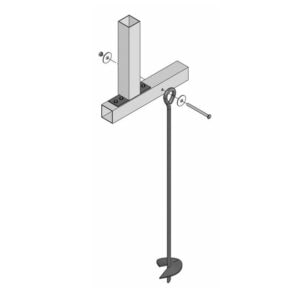
HUD Code & Wind Zone Requirements
Federal specifications for mobile home anchoring systems based on geographic wind zones
🌪️ Understanding Your Wind Zone
Every mobile home has a data plate showing the wind zone it was designed for. This determines your anchoring requirements:
Zone I (70 MPH)
Typical areas: Interior regions with moderate wind exposure
- • Minimum 4 anchors required
- • Standard steel straps acceptable
- • Basic tie-down configuration
Zone II (100 MPH)
Typical areas: Coastal regions and tornado-prone areas
- • 6-8 anchors typically required
- • Heavy-duty straps and hardware
- • Additional over-the-top tie-downs may be needed
Zone III (110+ MPH)
Typical areas: Hurricane zones and extreme wind areas
- • 8+ anchors required
- • Over-the-top tie-downs mandatory
- • Professional engineering may be required
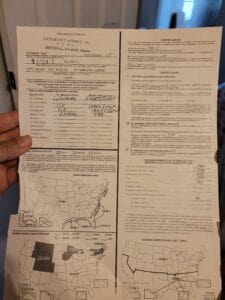
📖 HUD Code 3280.306 - Tie-Down Requirements
Anchor Specifications:
- • Minimum 3/4 inch diameter steel rod
- • 4,725 lbs minimum pull-out strength
- • Galvanized coating for corrosion resistance
- • 45-degree installation angle required
Installation Requirements:
- • Anchors must penetrate below frost line
- • Steel straps rated for wind zone loads
- • Professional installation and inspection
- • Annual maintenance documentation required
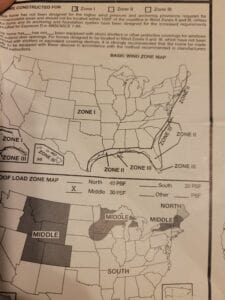
Professional Installation Guide
Step-by-step anchor installation process used by certified professionals
Site Assessment & Planning
- • Identify wind zone requirements from data plate
- • Assess soil composition and drainage
- • Mark utility lines and underground obstacles
- • Calculate anchor spacing per HUD code
Equipment & Materials
- • HUD-compliant steel anchors and straps
- • Professional installation equipment
- • Safety gear and measurement tools
- • Concrete for anchor stabilization
Anchor Installation
- • Drill holes at precise 45-degree angles
- • Install anchors to proper depth (3-5 feet)
- • Secure with concrete for maximum stability
- • Verify anchor alignment with I-beams
Strap Connection
- • Attach steel straps to mobile home frame
- • Connect straps to anchors with proper hardware
- • Tension straps to manufacturer specifications
- • Install over-the-top ties if required
Inspection & Testing
- • Verify all connections meet HUD standards
- • Test anchor pull-out strength
- • Document installation for insurance/permits
- • Schedule required inspections
Maintenance Setup
- • Create annual inspection schedule
- • Document anchor locations and specifications
- • Provide homeowner maintenance guidelines
- • Establish warranty and service plan
Professional Anchor Equipment
HUD-compliant anchors and installation equipment delivered directly to your door
HUD-compliant galvanized steel anchors with 4,725+ lbs pull-out strength. Includes all hardware for complete installation.
- • 3/4" galvanized steel construction
- • 4-6 foot lengths available
- • Corrosion-resistant coating
- • Complete hardware kit included
📦 Shipped directly to your door - avoid multiple store trips for complete installation kit
Professional-grade steel straps rated for all wind zones. Galvanized finish ensures long-term durability in harsh weather.
- • Wind zone rated capacity
- • Galvanized steel construction
- • Professional buckle system
- • Various lengths available
📦 Professional-grade straps delivered - hard to find locally in required quantities
Professional tools for proper anchor installation including specialized drill bits and driving equipment designed for mobile home anchoring systems.
- • Heavy-duty drill bits for steel and concrete
- • Angle guides for 45-degree installation
- • Professional tensioning tools
- • Complete installation hardware
📦 Complete tool kit shipped - specialized equipment not available in local stores
Complete safety gear for anchor installation including protective equipment and safety guidelines.
- • Hard hat and safety glasses
- • Cut-resistant work gloves
- • High-visibility safety vest
- • First aid kit included
📦 Professional safety kit delivered - OSHA-compliant equipment for DIY installation
Specialized equipment for safely removing existing anchors during mobile home relocation or system upgrades.
- • Heavy-duty anchor pullers
- • Chain and rigging equipment
- • Leverage multiplication systems
- • Safety protocols included
📦 Specialized removal equipment - save time and prevent injury during anchor extraction
Professional instruments for verifying proper installation and ongoing maintenance of anchor systems.
- • Digital angle gauges
- • Tension measurement tools
- • Pull-out strength testers
- • Documentation templates
📦 Professional measurement tools - ensure HUD compliance and safety standards
Maintenance & Inspection
Keep your mobile home anchors in optimal condition with regular maintenance and professional inspections
Annual Inspection Schedule
- • Visual inspection: Check all anchors and straps for damage
- • Tension check: Verify strap tension meets specifications
- • Corrosion assessment: Look for rust or deterioration
- • Connection integrity: Inspect all hardware and fasteners
- • Documentation: Record findings for insurance/warranty
Best inspection times: Spring (before storm season) and after severe weather events
Weather-Related Maintenance
- • Post-storm inspection: Check for damage or loosening after high winds
- • Seasonal adjustments: Account for ground freeze/thaw cycles
- • Moisture management: Ensure proper drainage around anchors
- • Corrosion prevention: Apply protective coatings as needed
Preventive Maintenance Tasks
- • Strap tension: Adjust as needed for proper load distribution
- • Hardware lubrication: Prevent corrosion and ensure operation
- • Anchor stability: Check for ground movement or settling
- • Vegetation control: Keep anchor areas clear of roots and debris
- • Professional service: Schedule expert inspection every 3-5 years
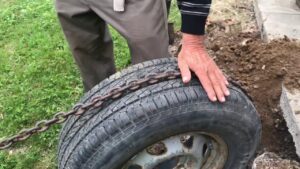
Common Problems & Solutions
Expert solutions to the most frequent mobile home anchor challenges
Anchor Failure & Damage
Symptoms: Bent anchors, broken straps, loose connections
Causes:
- • Severe weather exceeding design limits
- • Improper installation angle or depth
- • Corrosion from moisture exposure
- • Ground movement or soil erosion
Solutions:
- • Complete anchor system replacement
- • Upgrade to higher wind zone rating
- • Professional soil analysis and improvement
- • Alternative: Get cash offer for storm-damaged home
Installation & Code Issues
Problems:
- • Non-HUD compliant anchors installed
- • Incorrect wind zone specifications
- • Missing required inspections
- • Insurance compliance failures
Solutions:
- • Professional code compliance assessment
- • Complete system upgrade to current standards
- • Permit acquisition and inspection scheduling
- • Documentation for insurance requirements
Cost & Value Concerns
Issues:
- • High anchor replacement costs ($2,000-$5,000+)
- • Repeated anchor failures requiring ongoing investment
- • Additional structural problems revealed during installation
- • Insurance requirements for older mobile homes
Smart Alternatives:
- • Professional cost-benefit analysis
- • Explore financing options for upgrades
- • Consider cash sale: We buy homes with anchor problems
Anchor Removal & Mobile Home Moving
Professional techniques for safely removing anchors during mobile home relocation
Pre-Move Preparation
- • Disconnect all utilities and tie-down straps
- • Document anchor locations and specifications
- • Assess anchor condition for reuse potential
- • Obtain necessary permits for relocation
- • Schedule professional removal equipment
Related Article: How to Move a Mobile Home for Free
Safe Removal Techniques
Professional Methods:
- • Hydraulic anchor pullers for clean extraction
- • Chain and leverage systems for stubborn anchors
- • Tire leverage method for DIY removal
- • Safety protocols to prevent injury
Moving vs. Selling Considerations
Moving Costs Include:
- • Anchor removal: $500-$1,000
- • Transportation: $5,000-$15,000
- • New site preparation: $2,000-$5,000
- • Re-anchoring: $1,500-$2,500
- • Permits and inspections: $500-$1,500
Total moving costs: $9,500-$25,000+
Alternative: Get immediate cash offer - no moving costs or anchor removal needed
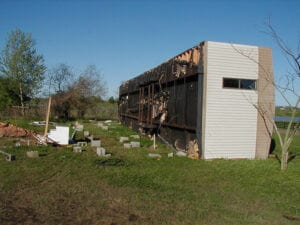
Storm Preparedness & Emergency Response
Critical information for mobile home safety during severe weather events
Storm Statistics & Risks
According to the National Weather Service:
- • 10,000+ thunderstorms annually in the US
- • 1,300+ tornadoes recorded each year
- • Mobile homes 15-20x more likely to be damaged
- • Proper anchoring reduces damage risk by 70%
Hurricane Zones: Coastal areas require enhanced anchoring systems and emergency evacuation plans.
Pre-Storm Checklist
- • Inspect all anchors and tie-down straps
- • Verify emergency contact information
- • Secure outdoor items (carports, sheds, furniture)
- • Review evacuation routes and shelter locations
- • Document property condition for insurance
- • Prepare emergency supplies and communications
Emergency Planning Resource: Ready.gov Emergency Planning
Carport & Shed Anchoring
Don't forget secondary structures:
- • Carports: Anchor to prevent wind uplift and projectile damage
- • Storage sheds: Secure lightweight metal structures
- • Awnings: Retract or secure during wind warnings
- • Landscaping: Remove potential projectiles
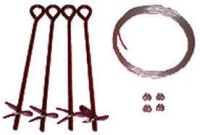
Frequently Asked Questions
Expert answers to the most common mobile home anchor questions
The number depends on your wind zone and home size. Minimum 4 anchors for Zone I (70 MPH), 6-8 for Zone II (100 MPH), and 8+ for Zone III (110+ MPH). Check your mobile home's data plate for specific requirements. Professional assessment ensures proper compliance.
HUD code requires minimum 4,725 lbs pull-out strength per anchor. Professional anchors typically exceed this rating. Actual strength depends on installation depth, soil conditions, and anchor type. Proper 45-degree installation angle maximizes holding power.
While DIY installation is possible, professional installation is strongly recommended for safety and code compliance. Professional installation costs $1,500-$2,500 but ensures proper wind resistance and insurance coverage. Alternative consideration: If anchor installation reveals other issues, getting a cash offer might be more cost-effective.
Annual inspections are recommended, typically in spring before storm season. Also inspect after severe weather events. Check for corrosion, loose connections, and proper strap tension. Professional inspection every 3-5 years ensures continued compliance and safety.
Yes, when properly installed, anchors are highly effective. HUD-compliant systems can withstand 75+ MPH winds. However, no anchoring system can guarantee protection against extreme weather like F3+ tornadoes or Category 4+ hurricanes. Regular maintenance is crucial for effectiveness.
Professional installation typically costs $1,500-$2,500 for a complete system. This includes anchors, straps, labor, and inspection. DIY installation costs $500-$1,000 in materials but requires specialized tools and knowledge. Consider total cost vs. home value when deciding.
Damaged anchors should always be replaced, not repaired. Compromised anchors cannot provide reliable protection and may fail during storms. Corrosion, bending, or loosening indicates the need for immediate replacement. The safety risk and insurance implications make replacement the only viable option.
Anchor removal requires specialized equipment and techniques. Professional removal costs $500-$1,000. DIY methods include hydraulic pullers or the tire leverage technique. However, total moving costs often exceed $10,000-$25,000. Consider: Selling for cash may be more economical than moving.
Success Stories
Real experiences from homeowners who solved their anchor challenges
"After hurricane damage to our anchor system, we got multiple quotes for $3,000+ to replace everything. Instead, we got a fair cash offer and moved to a safer location. Best decision we ever made!"
- Maria R., Tampa, Florida
"Our insurance company required anchor upgrades that would cost more than our home was worth. The cash offer allowed us to avoid the expensive repairs and find better housing."
- James T., Tulsa, Oklahoma
"Storm damage revealed multiple anchor failures and foundation problems. Rather than invest $5,000+ in repairs, we sold for cash and bought a newer home with proper anchoring."
- Linda K., Mobile, Alabama
"Found all the professional anchor equipment we needed delivered right to our door. Local stores didn't carry HUD-compliant anchors, but ordering online got us everything in one shipment."
- Steve H., Dayton, Ohio
"The anchor system held perfectly through last year's tornado warnings. Proper installation and quality equipment gave us peace of mind during severe weather season."
- Patricia L., Moore, Oklahoma
Facing Expensive Anchor Problems?
Don't spend thousands on anchor upgrades that may not protect against extreme weather. We buy mobile homes in any condition - anchor problems, storm damage, and all. Get a fair cash offer today.
✅ 30+ years experience • ✅ Fast cash offers • ✅ No anchor repairs required
We handle mobile homes with any anchor or foundation condition
Related Mobile Home Resources
Additional guides to help with your mobile home foundation and safety needs
Mobile Home Foundation Guide
Comprehensive guide to foundation types, requirements, and costs for manufactured homes including permanent and non-permanent options.
Read Foundation Guide →Mobile Home Blocking
Expert guide to mobile home blocking requirements, HUD compliance, and professional leveling solutions for stable foundations.
View Blocking Guide →Water Leak Solutions
Professional solutions for water leaks under mobile homes including emergency procedures and prevention strategies.
Get Leak Solutions →Mobile Home Moving
Complete guide to moving mobile homes including costs, permits, and free moving options for qualified buyers.
Learn About Moving →Crawl Space Vapor Barrier
Essential vapor barrier installation guide for mobile home moisture control and foundation protection.
View Vapor Barrier Guide →Mobile Home Data Plate
How to locate and read your mobile home data plate for wind zone requirements and anchor specifications.
Understand Data Plates →
